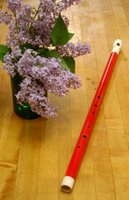People tend to discuss the speed at which they play dance music quite a bit, but lately I've been thinking about the speed at which I can listen.
Before I started learning to play the whistle a lot of dance music sounded like a blur to me. It was too fast for my mind to follow. Learning about different rhythm types helped a lot since I could follow the structure of the tune. So did counting reels in cut time.
But more than anything it seems to be a matter of practice. I'm learning to "listen quickly." The more active listening I do, the better I can follow fast tunes, and the more satisfying the listening becomes for me.


